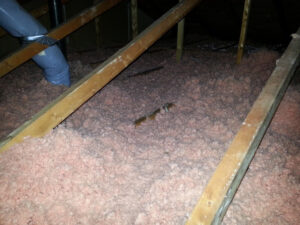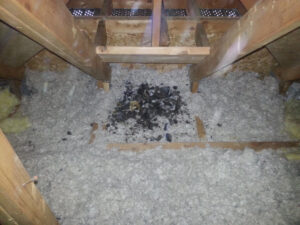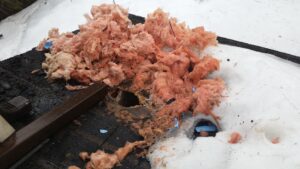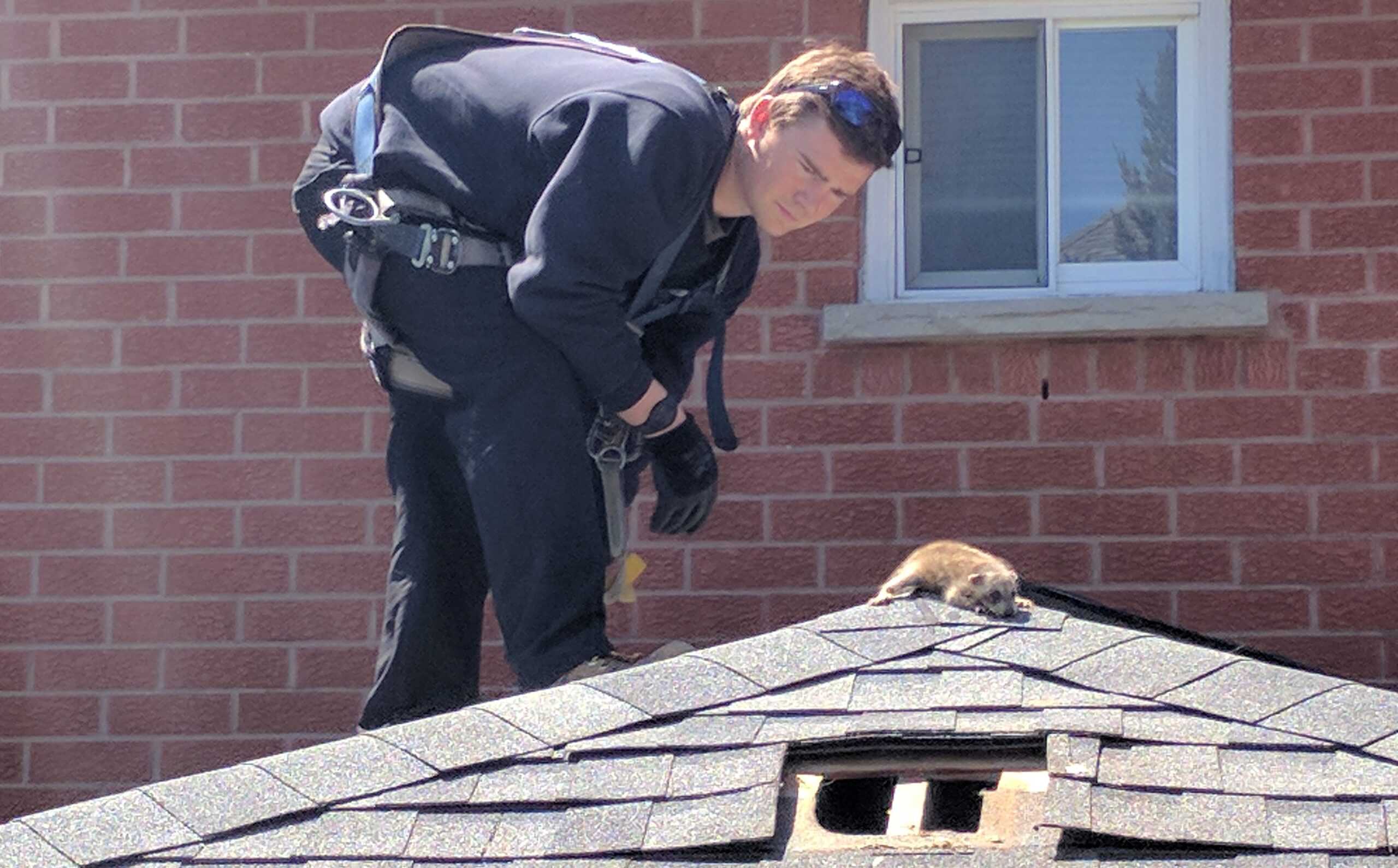Our homes offer us warmth, shelter and a pleasant place to live and sleep. These same qualities sometimes attract unwanted roommates. Raccoons and other wildlife may seek to set up a nest and have offspring in your home.
Discovering raccoons in your attic can be a cause for concern. Wild animals can be dangerous if you try to handle or disturb them, especially when they have young babies. Additionally, they can pose some significant health risks.
What Is Attracting Raccoons to Your Attic?
 Animals come to your home because they can find safety, comfort, and food there. For raccoons, in particular, the fact that they have adapted to human presence in their space means that they will abandon their traditional nesting locations in nature and gravitate to man-made structures such as commercial and residential buildings. Today’s wild animals that live in urban settings have also adapted their diets to survive. They tend to eat more of the waste food that is in the areas they frequent, as opposed to the foods that they are known to eat in the wild.
Animals come to your home because they can find safety, comfort, and food there. For raccoons, in particular, the fact that they have adapted to human presence in their space means that they will abandon their traditional nesting locations in nature and gravitate to man-made structures such as commercial and residential buildings. Today’s wild animals that live in urban settings have also adapted their diets to survive. They tend to eat more of the waste food that is in the areas they frequent, as opposed to the foods that they are known to eat in the wild.
Many human neighbourhoods, especially in growing cities such as Toronto, are being built in areas that raccoons were already occupying. This, paired with people leaving unsecured trash and other attractants outside, has caused some serious problems with raccoons living in the same areas as humans.
Raccoons have the twin combination of determination and savvy object manipulation skills. This allows them to thwart your efforts to keep them out of your garbage and other undesirable areas. Raccoons, for example, have been known to open bins that were designed to be impossible for them to breach. Evidence of raccoons’ human-like manipulation of locked bins and doors has been captured on video, proving what many homeowners have suspected for years, that raccoons are in fact special animals.
What Happens in Your Home When Raccoons Move In?
Raccoons are perhaps the most evolved wildlife that you will find invading your home. They generally prefer the attic because it is hidden from humans and pets but close enough to the food you have in the home. Sometimes, particularly in the spring and summer months, the raccoons nesting in your attic are actually mothers who are nursing their newborn kits.
As intelligent creatures, they will take advantage of all the resources around them. Unfortunately, this means that they will gladly damage your house and take things they need for survival. For example, we often find raccoon babies living in nests made from insulation and other building materials. They will also take advantage of the structural elements of your home such as roof eaves and gaps between studs to find the most secretive hiding spots.
The infectious diseases carried by raccoons can affect humans, as well as pets. If you have young children at home, they are also at high risk because they usually play outdoors and on the ground where they can be in direct contact with raccoon urine and feces. Raccoons frequently defecate and urinate in the same place and generate piles of feces called raccoon latrines. Raccoon latrines are generally found in tree bases, stumps, garages, under decks and in attics.
What Common Diseases do Raccoons Carry?
 Wildlife often carry diseases and can spread them, especially through droppings, urine or parasites. The following are some of the most common diseases carried by raccoons. The symptoms and descriptions provided below are only intended as general information to help you remain vigilant. If you develop symptoms, only a medical professional can provide a correct diagnosis and proper treatment:
Wildlife often carry diseases and can spread them, especially through droppings, urine or parasites. The following are some of the most common diseases carried by raccoons. The symptoms and descriptions provided below are only intended as general information to help you remain vigilant. If you develop symptoms, only a medical professional can provide a correct diagnosis and proper treatment:
Raccoon Roundworm
Raccoons can excrete roundworm eggs through their droppings. These eggs are very light and can become airborne. If these droppings are located anywhere nearby, humans can easily inhale these eggs and become infected. After the eggs are swallowed, they hatch into larvae that move to different parts of the body and can cause serious illness within a week. Raccoon roundworm is very dangerous and can be fatal if it is left untreated. It can affect the central nervous system, and can eventually impair important organs, including the brain. Severe consequences of roundworm disease can result in blindness or coma.
The symptoms of roundworm include:
- Fatigue
- Loss of muscle control
- Lack of coordination
- Loss of vision
Leptospirosis
Leptospirosis is a bacterial infection that raccoons can spread through their urine and droppings. This infection can be contracted by both humans and animals. If you have an open cut or wound and you have come in direct contact with raccoon urine or other secretions, you may contract the disease.
The symptoms of Leptospirosis include:
- Nausea and vomiting
- Diarrhea
- Severe head and muscle aches
- High fever
- Kidney and liver failure
Salmonella
Raccoon droppings can contain salmonella, a bacterium you may be most familiar with from undercooked poultry. This can be contracted by humans through transference to the mouth, typically by accidentally touching raccoon dropping then the face. The bacteria can stay dormant for a long time in dry conditions.
The symptoms of salmonella include:
- High fever
- Abdominal pain
- Severe diarrhea
- Loss of appetite
Rabies
Rabies is a viral disease that can be carried by a variety of species, including raccoons. It is very important to stay alert and vigilant if you have been bitten or scratched by an infected raccoon, as the disease can be fatal. Some signs that help identify a possible rabid raccoon are stumbling around as if they were drunk, froth forming at the mouth, aggressive behaviour and attacking inanimate objects or pets.
How to avoid being infected by raccoon dropping or urine:
- Discourage raccoons around your residence
- Never feed raccoons
- Feed pets inside and store pet food inside
- Keep pets inside at night
- Prevent raccoons from entering your house through pet doors or other openings
- Keep garbage and compost bins inside or use locking or secured lids outside
- Clean barbecue grills after each use
- Avoid contact with raccoon feces and call a professional if you notice raccoon latrines on your property
- Avoid direct contact with water, soil and vegetation that could be contaminated with raccoon urine
All these diseases and others spread by raccoons can be serious. Hire a professional raccoon removal service if you believe they are living in your home.
What Should You Do if You Come in Contact With Raccoons Feces?
- Immediately clean your hands thoroughly with antibacterial soap and monitor for symptoms of illness in the future.
- Be very careful to avoid spreading any germs or parasites elsewhere.
- If you do develop symptoms, seek diagnosis and treatment from a medical professional.
- If you think there is a possibility you or someone else has been exposed to rabies, seek treatment immediately.
- All raccoon exposures including bites and scratches should be assessed by a health care provider and reported to Public Health.
Raccoon exposures to pets should be reported to a veterinarian. Vaccinate cats, dogs and ferrets to protect them against rabies. The best thing you can do is to avoid any contact with raccoons or their droppings. Follow the above suggestions if you suspect any contact, even if you are unsure.
How Long Do Raccoons Live?
In the wild, raccoons typically live between two and three years. However, they are capable of living up to around 20 years in captivity. Therefore, if you have raccoons living comfortably in your attic, you may have housemates for a long time without professional removal.
What Is the Best Way To Get Rid of Raccoons?
If you have a problem with raccoons in your home, do not try to get them out yourself. Although they are not typically aggressive, raccoons can become very dangerous when they feel threatened. They have sharp teeth and claws. When you need to get one of these furry bandits out of your home, call a professional raccoon removal service such as Skedaddle Humane Wildlife Control for the safest, and most effective solutions..
Expert Solution – The Answer to Wildlife Problems
 Skedaddle has a team of highly skilled and efficient wildlife technicians who will initiate the wildlife removal process by examining your space. In doing so, we determine the extent of the invasion and also the species of wildlife that has invaded the space. Once we have completed the assessment, our technicians move on to removal through the use of specialized humane methods. After removing the animals, the team will proceed to clear all physical traces of their presence (this includes feces and urine among others) and sanitize the space to eliminate bacteria and viruses. The last part of your Skedaddle service is called protection and prevention and this is where the team closes off all potential access points and sets up deterrents that will keep the animals away.
Skedaddle has a team of highly skilled and efficient wildlife technicians who will initiate the wildlife removal process by examining your space. In doing so, we determine the extent of the invasion and also the species of wildlife that has invaded the space. Once we have completed the assessment, our technicians move on to removal through the use of specialized humane methods. After removing the animals, the team will proceed to clear all physical traces of their presence (this includes feces and urine among others) and sanitize the space to eliminate bacteria and viruses. The last part of your Skedaddle service is called protection and prevention and this is where the team closes off all potential access points and sets up deterrents that will keep the animals away.
Although they are intelligent and fascinating creatures to watch, raccoons should be living in their natural habitats, not your attic. If you suspect that you have raccoons living in or near your home, contact Skedaddle Humane Wildlife Control. We will help minimize the health risks and the chance of re-entry. Call us today.



